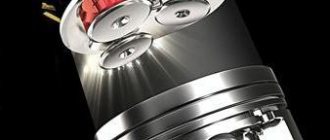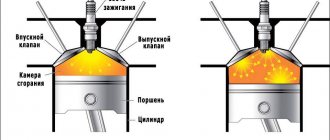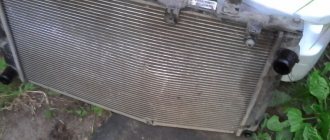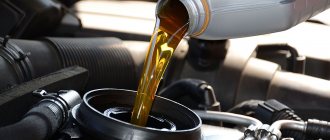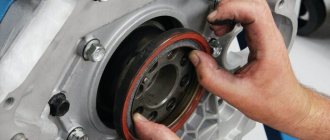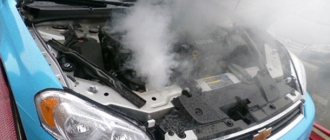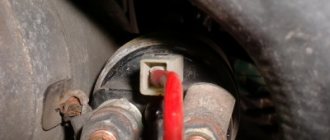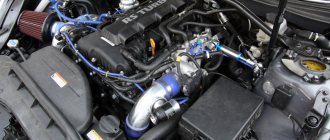Hello, dear friends! Today we have not the most pleasant topic, since we will discuss such an issue as engine detonation, causes, possible consequences and tips for elimination.
Similar phenomena are typical for gasoline and diesel engines, which contain an injector or carburetor. Detonation can occur at idle, directly during acceleration, and even after turning off the ignition, that is, no longer under load. Detonation is also typical for hot and cold internal combustion engines.
Many motorists are very concerned about this issue, since detonation often does not bode well for the engine. It is important not only to know the reasons, but also to understand the signs and understand how to act in a given situation. I will try to answer the main questions. If you have anything to add or have any questions, just leave feedback and write in the comments. And off we go!
Is there any benefit from a nulevik air filter, comparison with a regular one?
If the engine is operating normally and no malfunctions are observed, then the speed of fuel propagation is about 20-30 meters per second. When detonation occurs, this figure can increase tens of times. It is quite simple to recognize the occurrence of such a phenomenon, since a corresponding metallic sound occurs from the internal combustion engine. Among motorists, the concept of finger tapping is quite common. The reason for this noise is due to the fact that the blast waves contact the walls inside the combustion chamber. This contributes to a drop in the power of the internal combustion engine with a parallel rapid increase in consumption.
Detonation can also occur in a situation where the engine has already been turned off and the ignition has been turned off. The engine does not stop immediately, but still runs for about 20-25 seconds, and only then stalls. In such a situation, you should not wait until the engine stops on its own. It is necessary to help reduce the temperature inside by supplying additional fuel. To do this, simply press the gas pedal.
Recommendations from experienced motorists
In the manufacture of automobile engines, all parts have certain parameters designed for operation in nominal temperature conditions. When an engine detonates, the vehicle is subjected to shock loads that exceed permissible values. Uneven distribution of fuel and oxygen masses leads to unexpected strong explosions.
To identify and prevent cases of detonation, it is recommended to listen to the uniformity of the sounds of the running engine. If unusual tapping or noise is detected, you must stop and turn off the engine. Next, you need to determine the source of the unknown sounds and try to eliminate it.
To avoid devastating consequences, detonation must be constantly monitored. The main thing to remember is that during normal operation there should not be even slight changes in the sound of the motor.
Towbar for Mitsubishi Pajero 4: which one to buy, installation details
In fact, we are talking about a strong explosion inside the engine. As you understand, there is nothing good about it. This is very dangerous for the internal combustion engine. The heaviest load falls on the cylinders, which can ultimately lead to complete failure of the entire power unit. The first thing that usually blows is the cylinder head gasket. Since it cannot withstand increased mechanical and thermal loads, at best it will have to be replaced if it detonates. If the situation is more complex, then the crankshaft, cylinder head, cylinder-piston group, etc. will fail.
As you understand, no one has an intentional desire to encounter something like this. But sometimes not everyone manages to prevent such a situation from occurring.
Moreover, it is not so important what kind of car you have at your disposal. It could be an old VAZ 2109, a more recent Lada Granta, or even some Volkswagen Passat or Ford Ecosport of the latest generation.
It is also worth considering the presence of 2 types of detonation.
- Acceptable. Most motorists don't even notice when it occurs. And there’s nothing wrong with that. Such detonation is relevant in situations where the speed increases significantly. Moreover, the effect of the explosion disappears immediately. A similar phenomenon is relevant in engines with increased torque, large engine displacement and high power levels;
- Invalid. This is exactly what we are talking about in our material. It appears under conditions of increased engine load and high speeds. Sometimes just a few seconds are enough for the engine to fail due to detonation.
I think now everyone understands how bad it is when the engine detonates. You can move on to the next questions.
Engine detonation: main symptoms
So, detonation is an uncontrolled chaotic process of fuel combustion, which is more like explosions in a cylinder. Moreover, these conditional explosions occur untimely (for example, on the compression stroke, when the piston is still moving upward). As a result, the shock wave and high pressure cause severe loads on the elements of the CPG and crankshaft, literally destroying the engine.
Detonation is determined not only by sound, but also by a number of other signs. First of all, the engine loses power when you press the gas, and the engine may also smoke a little when you sharply press the accelerator pedal with grayish-black smoke. Typically, severe detonation is accompanied by engine overheating; at idle and under load, the operation of the internal combustion engine can be extremely unstable, the speed jumps, etc.
Signs of a faulty clutch release bearing: how to identify
- low quality fuel;
- improper operation of the vehicle;
- dirty fuel filter;
- using gasoline with a low octane number;
- malfunctions and incorrect operation of the fuel pump;
- mismatched spark plugs;
- contamination or breakdown of nozzles;
- problems with the oxygen sensor;
- cooling system malfunctions;
- design features, etc.
But how can you determine what exactly the car encountered in a particular situation? For this it is worth considering the reasons in more detail.
Fuel with the wrong octane number or low quality
If by mistake you fill the gas tank with fuel that has an octane rating lower than the values recommended by the car manufacturer, then with almost a 100% guarantee you can expect detonation inside the cylinder.
Low-quality gasoline can ignite at a lower compression ratio than that occurring inside the cylinder, causing fuel detonation.
To protect yourself from such a dangerous phenomenon as engine detonation, you should strictly adhere to the car manufacturer’s recommendations regarding the types of fuel used, visit only trustworthy gas stations and do not store gasoline in the fuel tank for more than one year (before using the car after a long period of inactivity, it is recommended to drain the fuel) .
Polish towbars Imiola: product description, customer reviews
There are several most common and probable reasons why the engine begins to detonate.
- Fuel quality. Sometimes, out of desperation or in order to save money, drivers stop at questionable gas stations, not knowing what quality of fuel they offer. Often, gas stations artificially increase the octane number by adding methane or propane. This causes detonation because the gas evaporates faster than pure gasoline. As a result, carbon deposits form on the walls, which then provokes the so-called glow ignition. This mixture ignites due to heated electrodes and carbon deposits on the inner walls. As a result, the ignition is turned off, but the engine is still running;
- Octane number. There are other situations when a driver deliberately saves on fuel by buying fuel with a lower octane number. Therefore, do not be surprised when, instead of the recommended 95, you pour 92 and even more so 80 gasoline, detonation appears;
- Spark plug. Often, motorists simply do not know how to choose them correctly, buying the cheapest ones or those recommended by the seller. Therefore, spark plugs are chosen strictly in accordance with the automaker’s recommendations for a specific engine;
- Design features. These include the pressure in the chambers, the structure of the piston bottom, the design of the combustion chamber, the location of the spark plugs, etc. Practice shows that with greater pressure created in the cylinders, the risk of detonation increases.
If you yourself cannot determine the cause, then you should not waste time and wait for everything to suddenly go away on its own. Go to a car service center, carry out diagnostics and solve the problem as quickly as possible.
Incorrectly configured ignition
Symptoms similar to engine knocking can occur when the ignition timing is set earlier than necessary. Now this is mostly a feature of archaic carburetor power units equipped with a distributor, where the torque was set manually. For internal combustion engines equipped with an electronic ignition and injection control unit, failures occur: due to spark plugs that do not match the heat rating, from overheating, or due to a malfunction of the oxygen sensor (lambda), based on the readings of which the injection control unit adjusts the volume of fuel supplied (leans the mixture) . A separate point is incorrect ignition settings during inept chip tuning. But this reason is quickly revealed by diagnostics.
Popular brands:
Hyundai Solaris, Mitsubishi Pajero Sport, Toyota Land Cruiser
Scandinavian light - an inexpensive alternative to DRLs: how to connect it yourself
There are several tips that you can follow in such situations. But do not forget that taking specific measures directly depends on what exactly was the cause of the detonation.
- If everything was fine before visiting the gas station, and then problems appeared, the reason is probably the fuel. It is better to drain it and refuel with higher quality fuel;
- When a machine is operated for a long time without load, carbon deposits often appear in the cylinders. It is he who provokes detonation. The best solution here would be to give the engine a load. That is, just accelerate the car to maximum speed for how many minutes, choosing a safe road;
- If it's a diesel engine that produces black or green exhaust when running, the pistons in the cylinders are probably damaged. Such smoke indicates the release of aluminum. You will have to change the entire piston group;
- If the spark plug malfunctions, you can try cleaning it. It’s better to just take a new and high-quality part;
- Check and adjust the ignition angle if necessary. Early ignition provokes overheating of the internal combustion engine. As a result, detonation occurs.
ICE detonation is definitely not something to joke about. This is a serious sign that requires immediate action from the motorist aimed at identifying the causes of internal explosions in the engine, as well as eliminating them.
Sometimes it is right to turn to specialists right away, rather than trying to figure out the reasons at random on your own. Don't be afraid to ask for help and consult with more experienced motorists. This is the only way to gain a solid store of knowledge by learning from others, and not from your own mistakes.
Thank you all for your attention! Be sure to subscribe, leave comments and ask relevant questions on the topic!
Incorrect driving style
Ignoring shifting gears from up to down when exiting a turn.
When overcoming a climb of medium duration, when at the beginning of the climb, 5th gear seems to be enough, but at the end of the climb it is not, but the driver still continues to squeeze the last forces out of the engine, without bothering to change to 4th or 3rd gear.
So you get the knocking of metal on metal (similar to the knocking of metal balls) inside the engine, this is how detonation of the latter mainly manifests itself.
In some car models, special sensors are installed that inform the driver through electronic devices about this phenomenon itself and its frequency.
Consequences
Engine detonation leads to a shortened engine life. Such a power unit is capable of traveling a maximum of 100,000 kilometers, after which the cylinder block or cylinder head will simply fall apart.
Too strong a detonation leads to instant destruction of the power unit. It will simply be blown to pieces. The cylinder head gasket fails first. It will be able to withstand one single detonation, after which it will burn out and leak oil and antifreeze.
If you have been driving a car with a knocking engine for a long time, then the following solutions await you at the service station:
- replacing the cylinder block;
- changing the crankshaft;
- installation of a new cylinder head and piston group.
However, all these problems can be avoided if you take care of the engine and attend service on time. It is necessary to change the oil every 7 thousand kilometers, and fill only high-quality AI 95 gasoline at proven gas stations.
